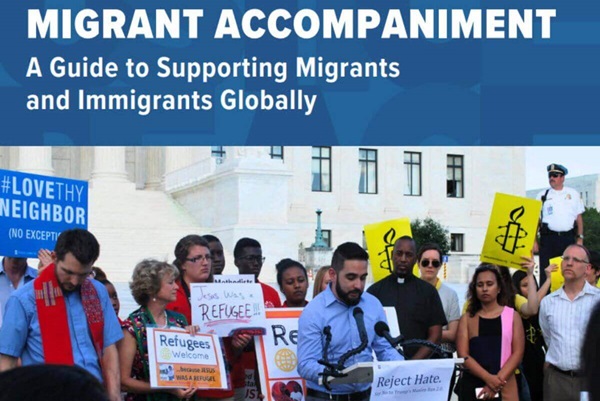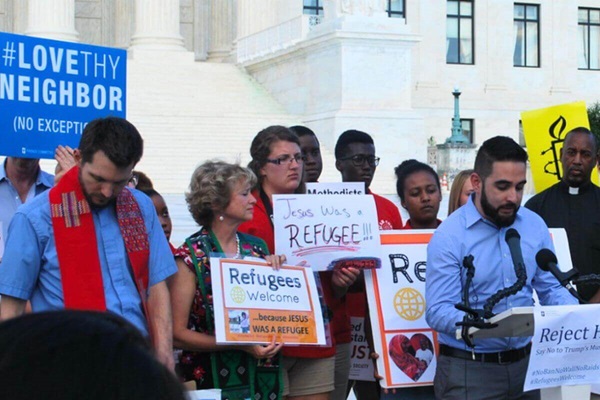The General Board of Church and Society issues a statement regarding the U.S. immigration deportation plans to be issued forth by president-elect Donald Trump.
Grounded in fear, hate and falsehoods, U.S. immigration policy calling for mass deportation of millions of people, is not an act of justice but a failure to recognize the sacred worth of every individual. Church and Society’s statement opposing those unfair policies is deeply rooted in John Wesley’s teachings on social holiness and grace. Wesleyan theology upholds prevenient grace — the belief that God’s grace goes before us and extends to all people, regardless of nationality, legal status, or social standing. Policies that promote exclusion and violence against vulnerable communities deny this essential truth.
Wesley’s emphasis on the practical outworking of faith compels us to advocate for the oppressed, speak out against systemic injustice, and extend compassion to the marginalized.
What does The United Methodist Church Say About Migrants, Immigrants and Refugees
The United Methodist Social Principles call for humane immigration policies, the protection of immigrant families, and the upholding of dignity for all persons as bearers of God’s image. Mass deportations tear apart families, destabilize communities, and exacerbate global suffering—actions that are incompatible with our Christian belief “to seek justice, love mercy, and walk humbly with our God” (Micah 6:8).
“We urge United Methodists to welcome migrants, refugees, and immigrants into their congregations and to commit themselves to providing concrete support, including help with navigating restrictive and often lengthy immigration policies, and assistance with securing food, housing, education, employment and other kinds of support.” (The Political Community, Basic Rights and Freedoms - section G, United Methodist Social Principles)

In addition, UMC Social Principles call for United Methodists to “oppose all laws and policies that attempt to criminalize, dehumanize or punish displaced individuals and families based on their status as migrants, immigrants or refugees”.
What Does The Bible Say About Migrants, Immigrants and Refugees
Throughout the Bible, God’s people are called to love migrants. From Genesis to Revelation, we see that God desires that we help the most vulnerable in our midst, especially the sojourner. Leviticus issues a call to love the sojourners in our midst, treating them as if they were one of our citizens (Leviticus 19:33-34). Hebrews tells us that in opening our homes to guests, we may be “entertaining angels without knowing it.” (Hebrews 13:2)
Jesus Christ himself was a refugee (Matthew 2:13-15), fleeing persecution under the oppressive regime of Herod. To support policies that perpetuate the suffering of immigrants and refugees is to betray Christ’s commandment to love our neighbors as ourselves (Mark 12:31).
How to Take Action and Make a Difference
As followers of Jesus Christ, who welcomed the stranger and commanded us to do likewise, we cannot remain silent in the face of actions that violate the Gospel’s call to justice and mercy. Therefore, we call upon United Methodists to resist these harmful and unjust proposals, while at the same time, offer radical hospitality that reflects Christ’s love.
We encourage local churches to welcome newly arriving migrants into their congregations; support churches that prayerfully choose to offer sanctuary for undocumented migrants facing deportation; advocate for just immigration reform; and hold elected leaders accountable for policies that do not honor human dignity and reflect God’s boundless love.
Let us continue to stand in solidarity with our immigrant siblings, working to build a society where all are truly welcomed, valued, and free.
For the Church and Society Resource Guide - “How To Support Migrants and Immigrants Globally,” click HERE
Read a pastoral letter from The UMC Council of Bishops concerning migrants, immigrants and refugees in the United States: English version, Portuguese version, Spanish version.
“The Spirit of the Lord is upon me… to proclaim good news to the poor… to set the oppressed free.” (Luke 4:18)
Originally published on January 13, 2025, by Church and Society. Republished with permission by ResourceUMC.

